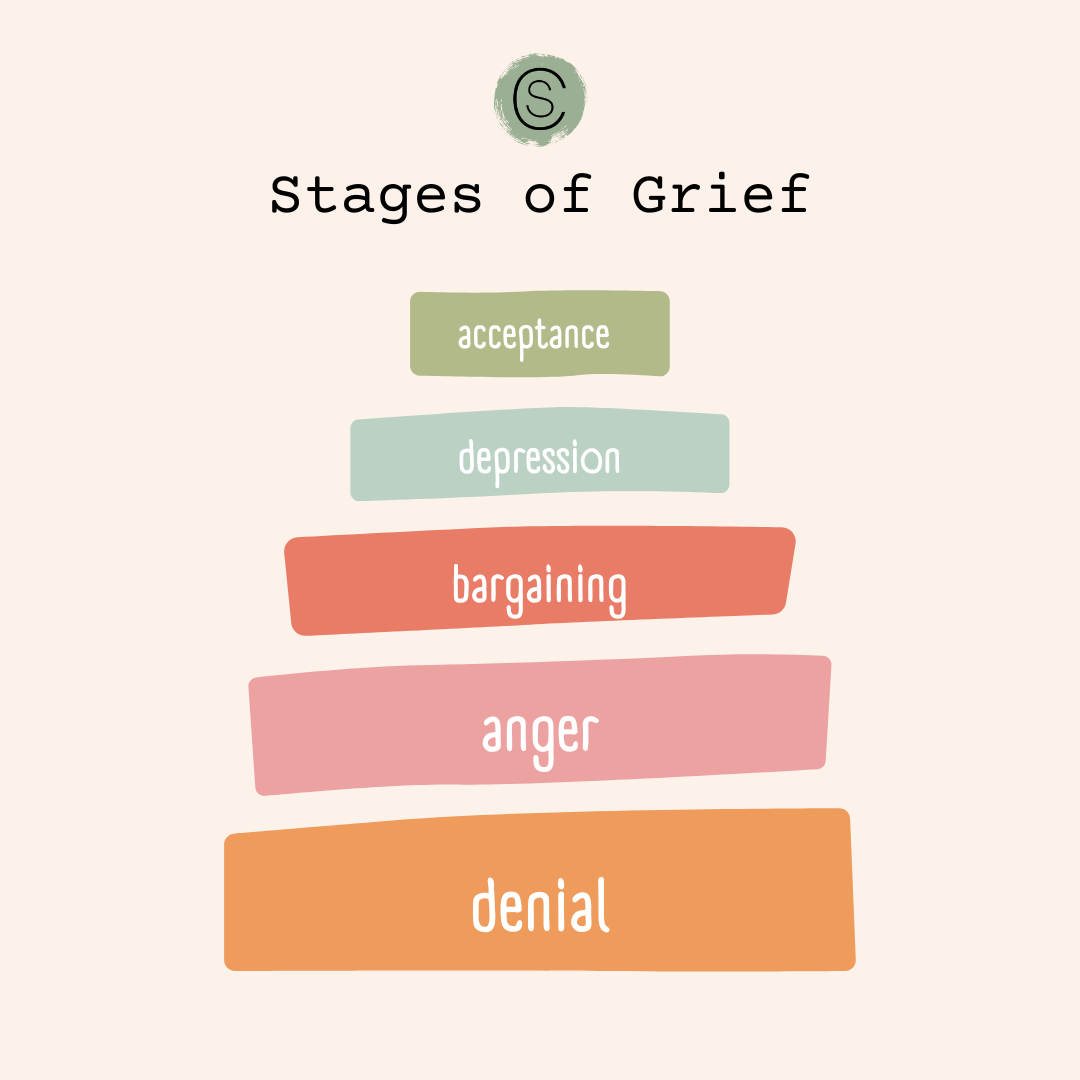Navigating Grief and Loss: Understanding and Coping with the Five Stages
Did you know that grief is a natural response to loss? Grief is a natural response to various significant changes in life, such as the death of a loved one, job termination, transitioning to a new life stage, or the end of a meaningful relationship.

Benefits of Working With A Grief Counselor
Research highlights how counseling can support individuals ranging from kids to adults in navigating the grief process. Working with a counselor can help by:
- Providing Emotional Support: Working with a counselor, whether through online sessions or in-office visits, can offer a compassionate and non-judgmental space where you can freely express your feelings and share your story. This is your space sto talk about your loss and begin the grief process.
- Normalizing the Grieving Process: When it comes to grief, it’s essential to know that it is a natural process. What you are feeling is natural. Recognizing that your emotional reactions are normal and expected can significantly reduce feelings of isolation and confusion. A skilled mental health counselor can help you experience the grieving process in a healthy and constructive way.
- Coping Skills: Working with a licensed counselor can equip you with a healthy outlet for emotional expression as well as a space to learn evidence-based tools to navigate the healing process. Common ways to heal include talking with a trusted friend, engaging in physical activity, or writing in a journal.

5 Stages Of Grief
1. Denial: The Initial Shock
The first stage of grief is denial. One of the key ways to know if you are in this stage is if you feel that you are in a state of shock. The emotional state of shock can occur as a defense mechanism. What takes place is that at an internal level, your mind and body shift to a mode of survival.
In some ways, this can help you survive the impact of the loss. During the first stage of grief, you might feel numb or disconnected from life. In other words, you may feel that you are in your own reality.
Common thoughts that people experience with this stage of grief include:
- “This can’t be happening to me.”
- “There must be a mistake.”
For more on the first stage of grief click here.
2. Anger: A Natural Reaction
The second stage of grief is anger. It’s important to remember that anger is a natural response. You can even see anger depicted in the movie, Inside Out. I like to think that the movie aims to educate us that it’s okay to experience anger. As the initial shock wears off from stage 1 of grief, it’s common to experience anger.
This stage can show up as frustration, rage, or irritation. If it’s helpful think about anger as the tip of the iceberg that you see above water. Below the water is the rest of the iceberg. Below the water is where you hold the frustration or perhaps that rage.
Anger is often directed towards oneself, others, or even the person who has passed away. Anger often masks the underlying pain and sadness associated with the loss.
It’s important to allow yourself to feel anger compassionately and healthily. This means that you give yourself time to experience it without judgment. Click here for helpful grief journal prompts that can be of support.
3. Bargaining: Seeking Control
The third stage of grief is an interesting one. It’s often one that many can relate to. Losing someone is not easy and in many ways, it can take place when you are least ready.
In the bargaining stage, you may find yourself making deals or promises. You do this often on an internal level. It can be internal thoughts you keep private. Bargaining is done as an attempt to regain control over the situation.
Common thoughts during this stage include:
- “If only I had done something differently”
- “I promise to be better if this pain goes away.”
You may find yourself bargaining as a way to reduce the difficult thoughts and feelings that come with grief. In addition, this can be done to make sense of the loss and create meaning over it.
4. Depression: A Deep Sadness
This is a common stage that people reach out for counseling in. I think that it’s due to the overwhelm that comes with depression. Depression is perhaps the most challenging stage of grief.
When you experience depression during grief, it’s not only sadness that you feel. Depression can come with a mixture of feelings, thoughts, and even behavioral shifts. You may experience intense feelings of sadness, loneliness, and despair. You might withdraw from people, places, and activities you once enjoyed.
You may start to experience changes in appetite or sleep patterns. Such as not feeling hungry or overeating to calm certain feelings. Lastly, this stage of grief can leave you feeling a profound sense of emptiness.
Seeking support from a professional counselor can provide additional comfort and understanding during this difficult time. Contact us to start counseling. You can fill out the form below, call, or text our office.
5. Acceptance: Finding a New Normal
The final stage of grief is acceptance. It’s important to know that this doesn’t mean you are forgetting about the loss. You are instead, reaching a stage in which you are able to move your life forward in a healthy manner.
You are able to remove the anger and depression. You are able to carry the memories with you in a manner that holds the unique meaning that you need to move forward.
The last stage of grief signifies reaching a point where you can acknowledge the reality of the situation. You are able to in this stage, live with it.
Some people describe this stage as one of peace and understanding.



